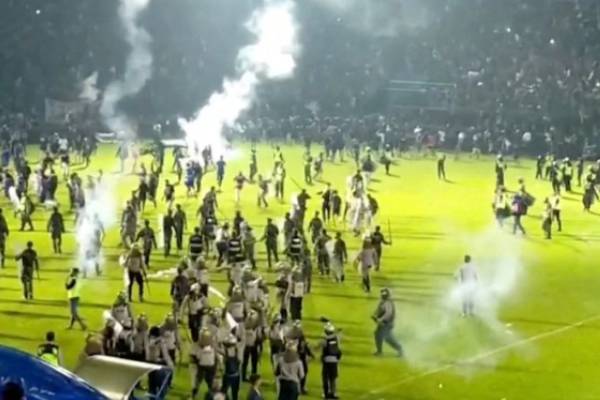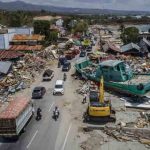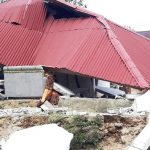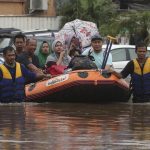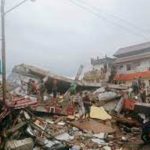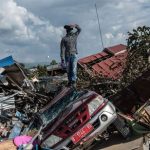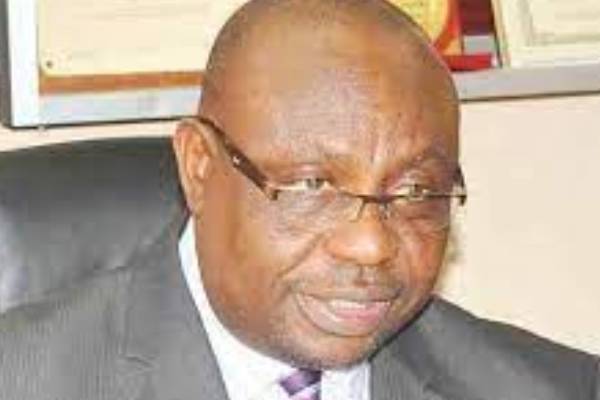The death toll from panic at an Indonesian soccer match climbed to 174, most of whom were trampled to death after police fired tear gas to dispel riots Saturday, making it one of the deadliest sports events in the world.
Riots broke out after the game ended Saturday evening with host Arema FC of East Java’s Malang city losing to Persebaya of Surabaya 3-2.
Disappointed after their team’s loss, thousands of supporters of Arema, known as “Aremania,” reacted by throwing bottles and other objects at players and soccer officials. Fans flooded the Kanjuruhan stadium pitch in protest and demanded that Arema management explain why, after 23 years of undefeated home games, this match ended in a loss, witnesses said.
The rioting spread outside the stadium where at least five police vehicles were toppled and set ablaze amid the chaos. Riot police responded by firing tear gas, including toward the stadium’s stands, causing panic among the crowd. Tear gas is banned at soccer stadiums by FIFA.
Some suffocated and others were trampled as hundreds of people ran to the exit in an effort to avoid the tear gas. In the chaos, 34 died at the stadium, including two officers, and some reports include children among the casualties.
“We have already done a preventive action before finally firing the tear gas as [fans] began to attack the police, acting anarchically and burning vehicles,” said East Java police chief Nico Afinta in a news conference early Sunday.
More than 300 people were rushed to nearby hospitals to treat injuries but many died on the way and during treatment, Afinta said.
East Java’s Vice Gov. Emil Dardak told Kompas TV in an interview Sunday the death toll has climbed to 174, while more than 100 injured people are receiving intensive treatment in eight hospitals without any charge, 11 of them in critical condition.
Indonesia’s soccer association, known as PSSI, has suspended the premier soccer league Liga 1 indefinitely in light of the tragedy and banned Arema from hosting soccer matches for the remainder of the season.
Television reports showed police and rescuers evacuating the injured and carrying the dead to ambulances.
Grieving relatives waited for information about their loved ones at Malang’s Saiful Anwar General Hospital. Others tried to identify the bodies laid at a morgue.
Indonesia’s president Joko Widodo expressed his deep condolences for the dead in televised remarks Sunday.
“I deeply regret this tragedy and I hope this is the last soccer tragedy in this country, don’t let another human tragedy like this happen in the future,” Widodo said. “We must continue to maintain sportsmanship, humanity and a sense of brotherhood of the Indonesian nation.”
He ordered the Youth and Sports minister, the National Police chief and the PSSI chair to conduct a thorough evaluation of the country’s soccer match and its security procedure.
He also ordered PSSI to temporarily suspend Liga 1 until it could be evaluated and security procedures improved.
Youth and Sports Minister Zainudin Amali also expressed his regret that “this tragedy happened when we were preparing for soccer game activities, both national and international level.”
The death toll from panic at an Indonesian soccer match climbed to 174, most of whom were trampled to death after police fired tear gas to dispel riots Saturday, making it one of the deadliest sports events in the world.
Riots broke out after the game ended Saturday evening with host Arema FC of East Java’s Malang city losing to Persebaya of Surabaya 3-2.
Disappointed after their team’s loss, thousands of supporters of Arema, known as “Aremania,” reacted by throwing bottles and other objects at players and soccer officials. Fans flooded the Kanjuruhan stadium pitch in protest and demanded that Arema management explain why, after 23 years of undefeated home games, this match ended in a loss, witnesses said.
The rioting spread outside the stadium where at least five police vehicles were toppled and set ablaze amid the chaos. Riot police responded by firing tear gas, including toward the stadium’s stands, causing panic among the crowd. Tear gas is banned at soccer stadiums by FIFA.
Some suffocated and others were trampled as hundreds of people ran to the exit in an effort to avoid the tear gas. In the chaos, 34 died at the stadium, including two officers, and some reports include children among the casualties.
“We have already done a preventive action before finally firing the tear gas as [fans] began to attack the police, acting anarchically and burning vehicles,” said East Java police chief Nico Afinta in a news conference early Sunday.
More than 300 people were rushed to nearby hospitals to treat injuries but many died on the way and during treatment, Afinta said.
East Java’s Vice Gov. Emil Dardak told Kompas TV in an interview Sunday the death toll has climbed to 174, while more than 100 injured people are receiving intensive treatment in eight hospitals without any charge, 11 of them in critical condition.
Indonesia’s soccer association, known as PSSI, has suspended the premier soccer league Liga 1 indefinitely in light of the tragedy and banned Arema from hosting soccer matches for the remainder of the season.
Television reports showed police and rescuers evacuating the injured and carrying the dead to ambulances.
Grieving relatives waited for information about their loved ones at Malang’s Saiful Anwar General Hospital. Others tried to identify the bodies laid at a morgue.
Indonesia’s president Joko Widodo expressed his deep condolences for the dead in televised remarks Sunday.
“I deeply regret this tragedy and I hope this is the last soccer tragedy in this country, don’t let another human tragedy like this happen in the future,” Widodo said. “We must continue to maintain sportsmanship, humanity and a sense of brotherhood of the Indonesian nation.”
He ordered the Youth and Sports minister, the National Police chief and the PSSI chair to conduct a thorough evaluation of the country’s soccer match and its security procedure.
He also ordered PSSI to temporarily suspend Liga 1 until it could be evaluated and security procedures improved.
Youth and Sports Minister Zainudin Amali also expressed his regret that “this tragedy happened when we were preparing for soccer game activities, both national and international level.”
The death toll from panic at an Indonesian soccer match climbed to 174, most of whom were trampled to death after police fired tear gas to dispel riots Saturday, making it one of the deadliest sports events in the world.
Riots broke out after the game ended Saturday evening with host Arema FC of East Java’s Malang city losing to Persebaya of Surabaya 3-2.
Disappointed after their team’s loss, thousands of supporters of Arema, known as “Aremania,” reacted by throwing bottles and other objects at players and soccer officials. Fans flooded the Kanjuruhan stadium pitch in protest and demanded that Arema management explain why, after 23 years of undefeated home games, this match ended in a loss, witnesses said.
The rioting spread outside the stadium where at least five police vehicles were toppled and set ablaze amid the chaos. Riot police responded by firing tear gas, including toward the stadium’s stands, causing panic among the crowd. Tear gas is banned at soccer stadiums by FIFA.
Some suffocated and others were trampled as hundreds of people ran to the exit in an effort to avoid the tear gas. In the chaos, 34 died at the stadium, including two officers, and some reports include children among the casualties.
“We have already done a preventive action before finally firing the tear gas as [fans] began to attack the police, acting anarchically and burning vehicles,” said East Java police chief Nico Afinta in a news conference early Sunday.
More than 300 people were rushed to nearby hospitals to treat injuries but many died on the way and during treatment, Afinta said.
East Java’s Vice Gov. Emil Dardak told Kompas TV in an interview Sunday the death toll has climbed to 174, while more than 100 injured people are receiving intensive treatment in eight hospitals without any charge, 11 of them in critical condition.
Indonesia’s soccer association, known as PSSI, has suspended the premier soccer league Liga 1 indefinitely in light of the tragedy and banned Arema from hosting soccer matches for the remainder of the season.
Television reports showed police and rescuers evacuating the injured and carrying the dead to ambulances.
Grieving relatives waited for information about their loved ones at Malang’s Saiful Anwar General Hospital. Others tried to identify the bodies laid at a morgue.
Indonesia’s president Joko Widodo expressed his deep condolences for the dead in televised remarks Sunday.
“I deeply regret this tragedy and I hope this is the last soccer tragedy in this country, don’t let another human tragedy like this happen in the future,” Widodo said. “We must continue to maintain sportsmanship, humanity and a sense of brotherhood of the Indonesian nation.”
He ordered the Youth and Sports minister, the National Police chief and the PSSI chair to conduct a thorough evaluation of the country’s soccer match and its security procedure.
He also ordered PSSI to temporarily suspend Liga 1 until it could be evaluated and security procedures improved.
Youth and Sports Minister Zainudin Amali also expressed his regret that “this tragedy happened when we were preparing for soccer game activities, both national and international level.”
The death toll from panic at an Indonesian soccer match climbed to 174, most of whom were trampled to death after police fired tear gas to dispel riots Saturday, making it one of the deadliest sports events in the world.
Riots broke out after the game ended Saturday evening with host Arema FC of East Java’s Malang city losing to Persebaya of Surabaya 3-2.
Disappointed after their team’s loss, thousands of supporters of Arema, known as “Aremania,” reacted by throwing bottles and other objects at players and soccer officials. Fans flooded the Kanjuruhan stadium pitch in protest and demanded that Arema management explain why, after 23 years of undefeated home games, this match ended in a loss, witnesses said.
The rioting spread outside the stadium where at least five police vehicles were toppled and set ablaze amid the chaos. Riot police responded by firing tear gas, including toward the stadium’s stands, causing panic among the crowd. Tear gas is banned at soccer stadiums by FIFA.
Some suffocated and others were trampled as hundreds of people ran to the exit in an effort to avoid the tear gas. In the chaos, 34 died at the stadium, including two officers, and some reports include children among the casualties.
“We have already done a preventive action before finally firing the tear gas as [fans] began to attack the police, acting anarchically and burning vehicles,” said East Java police chief Nico Afinta in a news conference early Sunday.
More than 300 people were rushed to nearby hospitals to treat injuries but many died on the way and during treatment, Afinta said.
East Java’s Vice Gov. Emil Dardak told Kompas TV in an interview Sunday the death toll has climbed to 174, while more than 100 injured people are receiving intensive treatment in eight hospitals without any charge, 11 of them in critical condition.
Indonesia’s soccer association, known as PSSI, has suspended the premier soccer league Liga 1 indefinitely in light of the tragedy and banned Arema from hosting soccer matches for the remainder of the season.
Television reports showed police and rescuers evacuating the injured and carrying the dead to ambulances.
Grieving relatives waited for information about their loved ones at Malang’s Saiful Anwar General Hospital. Others tried to identify the bodies laid at a morgue.
Indonesia’s president Joko Widodo expressed his deep condolences for the dead in televised remarks Sunday.
“I deeply regret this tragedy and I hope this is the last soccer tragedy in this country, don’t let another human tragedy like this happen in the future,” Widodo said. “We must continue to maintain sportsmanship, humanity and a sense of brotherhood of the Indonesian nation.”
He ordered the Youth and Sports minister, the National Police chief and the PSSI chair to conduct a thorough evaluation of the country’s soccer match and its security procedure.
He also ordered PSSI to temporarily suspend Liga 1 until it could be evaluated and security procedures improved.
Youth and Sports Minister Zainudin Amali also expressed his regret that “this tragedy happened when we were preparing for soccer game activities, both national and international level.”
The death toll from panic at an Indonesian soccer match climbed to 174, most of whom were trampled to death after police fired tear gas to dispel riots Saturday, making it one of the deadliest sports events in the world.
Riots broke out after the game ended Saturday evening with host Arema FC of East Java’s Malang city losing to Persebaya of Surabaya 3-2.
Disappointed after their team’s loss, thousands of supporters of Arema, known as “Aremania,” reacted by throwing bottles and other objects at players and soccer officials. Fans flooded the Kanjuruhan stadium pitch in protest and demanded that Arema management explain why, after 23 years of undefeated home games, this match ended in a loss, witnesses said.
The rioting spread outside the stadium where at least five police vehicles were toppled and set ablaze amid the chaos. Riot police responded by firing tear gas, including toward the stadium’s stands, causing panic among the crowd. Tear gas is banned at soccer stadiums by FIFA.
Some suffocated and others were trampled as hundreds of people ran to the exit in an effort to avoid the tear gas. In the chaos, 34 died at the stadium, including two officers, and some reports include children among the casualties.
“We have already done a preventive action before finally firing the tear gas as [fans] began to attack the police, acting anarchically and burning vehicles,” said East Java police chief Nico Afinta in a news conference early Sunday.
More than 300 people were rushed to nearby hospitals to treat injuries but many died on the way and during treatment, Afinta said.
East Java’s Vice Gov. Emil Dardak told Kompas TV in an interview Sunday the death toll has climbed to 174, while more than 100 injured people are receiving intensive treatment in eight hospitals without any charge, 11 of them in critical condition.
Indonesia’s soccer association, known as PSSI, has suspended the premier soccer league Liga 1 indefinitely in light of the tragedy and banned Arema from hosting soccer matches for the remainder of the season.
Television reports showed police and rescuers evacuating the injured and carrying the dead to ambulances.
Grieving relatives waited for information about their loved ones at Malang’s Saiful Anwar General Hospital. Others tried to identify the bodies laid at a morgue.
Indonesia’s president Joko Widodo expressed his deep condolences for the dead in televised remarks Sunday.
“I deeply regret this tragedy and I hope this is the last soccer tragedy in this country, don’t let another human tragedy like this happen in the future,” Widodo said. “We must continue to maintain sportsmanship, humanity and a sense of brotherhood of the Indonesian nation.”
He ordered the Youth and Sports minister, the National Police chief and the PSSI chair to conduct a thorough evaluation of the country’s soccer match and its security procedure.
He also ordered PSSI to temporarily suspend Liga 1 until it could be evaluated and security procedures improved.
Youth and Sports Minister Zainudin Amali also expressed his regret that “this tragedy happened when we were preparing for soccer game activities, both national and international level.”
The death toll from panic at an Indonesian soccer match climbed to 174, most of whom were trampled to death after police fired tear gas to dispel riots Saturday, making it one of the deadliest sports events in the world.
Riots broke out after the game ended Saturday evening with host Arema FC of East Java’s Malang city losing to Persebaya of Surabaya 3-2.
Disappointed after their team’s loss, thousands of supporters of Arema, known as “Aremania,” reacted by throwing bottles and other objects at players and soccer officials. Fans flooded the Kanjuruhan stadium pitch in protest and demanded that Arema management explain why, after 23 years of undefeated home games, this match ended in a loss, witnesses said.
The rioting spread outside the stadium where at least five police vehicles were toppled and set ablaze amid the chaos. Riot police responded by firing tear gas, including toward the stadium’s stands, causing panic among the crowd. Tear gas is banned at soccer stadiums by FIFA.
Some suffocated and others were trampled as hundreds of people ran to the exit in an effort to avoid the tear gas. In the chaos, 34 died at the stadium, including two officers, and some reports include children among the casualties.
“We have already done a preventive action before finally firing the tear gas as [fans] began to attack the police, acting anarchically and burning vehicles,” said East Java police chief Nico Afinta in a news conference early Sunday.
More than 300 people were rushed to nearby hospitals to treat injuries but many died on the way and during treatment, Afinta said.
East Java’s Vice Gov. Emil Dardak told Kompas TV in an interview Sunday the death toll has climbed to 174, while more than 100 injured people are receiving intensive treatment in eight hospitals without any charge, 11 of them in critical condition.
Indonesia’s soccer association, known as PSSI, has suspended the premier soccer league Liga 1 indefinitely in light of the tragedy and banned Arema from hosting soccer matches for the remainder of the season.
Television reports showed police and rescuers evacuating the injured and carrying the dead to ambulances.
Grieving relatives waited for information about their loved ones at Malang’s Saiful Anwar General Hospital. Others tried to identify the bodies laid at a morgue.
Indonesia’s president Joko Widodo expressed his deep condolences for the dead in televised remarks Sunday.
“I deeply regret this tragedy and I hope this is the last soccer tragedy in this country, don’t let another human tragedy like this happen in the future,” Widodo said. “We must continue to maintain sportsmanship, humanity and a sense of brotherhood of the Indonesian nation.”
He ordered the Youth and Sports minister, the National Police chief and the PSSI chair to conduct a thorough evaluation of the country’s soccer match and its security procedure.
He also ordered PSSI to temporarily suspend Liga 1 until it could be evaluated and security procedures improved.
Youth and Sports Minister Zainudin Amali also expressed his regret that “this tragedy happened when we were preparing for soccer game activities, both national and international level.”
The death toll from panic at an Indonesian soccer match climbed to 174, most of whom were trampled to death after police fired tear gas to dispel riots Saturday, making it one of the deadliest sports events in the world.
Riots broke out after the game ended Saturday evening with host Arema FC of East Java’s Malang city losing to Persebaya of Surabaya 3-2.
Disappointed after their team’s loss, thousands of supporters of Arema, known as “Aremania,” reacted by throwing bottles and other objects at players and soccer officials. Fans flooded the Kanjuruhan stadium pitch in protest and demanded that Arema management explain why, after 23 years of undefeated home games, this match ended in a loss, witnesses said.
The rioting spread outside the stadium where at least five police vehicles were toppled and set ablaze amid the chaos. Riot police responded by firing tear gas, including toward the stadium’s stands, causing panic among the crowd. Tear gas is banned at soccer stadiums by FIFA.
Some suffocated and others were trampled as hundreds of people ran to the exit in an effort to avoid the tear gas. In the chaos, 34 died at the stadium, including two officers, and some reports include children among the casualties.
“We have already done a preventive action before finally firing the tear gas as [fans] began to attack the police, acting anarchically and burning vehicles,” said East Java police chief Nico Afinta in a news conference early Sunday.
More than 300 people were rushed to nearby hospitals to treat injuries but many died on the way and during treatment, Afinta said.
East Java’s Vice Gov. Emil Dardak told Kompas TV in an interview Sunday the death toll has climbed to 174, while more than 100 injured people are receiving intensive treatment in eight hospitals without any charge, 11 of them in critical condition.
Indonesia’s soccer association, known as PSSI, has suspended the premier soccer league Liga 1 indefinitely in light of the tragedy and banned Arema from hosting soccer matches for the remainder of the season.
Television reports showed police and rescuers evacuating the injured and carrying the dead to ambulances.
Grieving relatives waited for information about their loved ones at Malang’s Saiful Anwar General Hospital. Others tried to identify the bodies laid at a morgue.
Indonesia’s president Joko Widodo expressed his deep condolences for the dead in televised remarks Sunday.
“I deeply regret this tragedy and I hope this is the last soccer tragedy in this country, don’t let another human tragedy like this happen in the future,” Widodo said. “We must continue to maintain sportsmanship, humanity and a sense of brotherhood of the Indonesian nation.”
He ordered the Youth and Sports minister, the National Police chief and the PSSI chair to conduct a thorough evaluation of the country’s soccer match and its security procedure.
He also ordered PSSI to temporarily suspend Liga 1 until it could be evaluated and security procedures improved.
Youth and Sports Minister Zainudin Amali also expressed his regret that “this tragedy happened when we were preparing for soccer game activities, both national and international level.”
The death toll from panic at an Indonesian soccer match climbed to 174, most of whom were trampled to death after police fired tear gas to dispel riots Saturday, making it one of the deadliest sports events in the world.
Riots broke out after the game ended Saturday evening with host Arema FC of East Java’s Malang city losing to Persebaya of Surabaya 3-2.
Disappointed after their team’s loss, thousands of supporters of Arema, known as “Aremania,” reacted by throwing bottles and other objects at players and soccer officials. Fans flooded the Kanjuruhan stadium pitch in protest and demanded that Arema management explain why, after 23 years of undefeated home games, this match ended in a loss, witnesses said.
The rioting spread outside the stadium where at least five police vehicles were toppled and set ablaze amid the chaos. Riot police responded by firing tear gas, including toward the stadium’s stands, causing panic among the crowd. Tear gas is banned at soccer stadiums by FIFA.
Some suffocated and others were trampled as hundreds of people ran to the exit in an effort to avoid the tear gas. In the chaos, 34 died at the stadium, including two officers, and some reports include children among the casualties.
“We have already done a preventive action before finally firing the tear gas as [fans] began to attack the police, acting anarchically and burning vehicles,” said East Java police chief Nico Afinta in a news conference early Sunday.
More than 300 people were rushed to nearby hospitals to treat injuries but many died on the way and during treatment, Afinta said.
East Java’s Vice Gov. Emil Dardak told Kompas TV in an interview Sunday the death toll has climbed to 174, while more than 100 injured people are receiving intensive treatment in eight hospitals without any charge, 11 of them in critical condition.
Indonesia’s soccer association, known as PSSI, has suspended the premier soccer league Liga 1 indefinitely in light of the tragedy and banned Arema from hosting soccer matches for the remainder of the season.
Television reports showed police and rescuers evacuating the injured and carrying the dead to ambulances.
Grieving relatives waited for information about their loved ones at Malang’s Saiful Anwar General Hospital. Others tried to identify the bodies laid at a morgue.
Indonesia’s president Joko Widodo expressed his deep condolences for the dead in televised remarks Sunday.
“I deeply regret this tragedy and I hope this is the last soccer tragedy in this country, don’t let another human tragedy like this happen in the future,” Widodo said. “We must continue to maintain sportsmanship, humanity and a sense of brotherhood of the Indonesian nation.”
He ordered the Youth and Sports minister, the National Police chief and the PSSI chair to conduct a thorough evaluation of the country’s soccer match and its security procedure.
He also ordered PSSI to temporarily suspend Liga 1 until it could be evaluated and security procedures improved.
Youth and Sports Minister Zainudin Amali also expressed his regret that “this tragedy happened when we were preparing for soccer game activities, both national and international level.”

